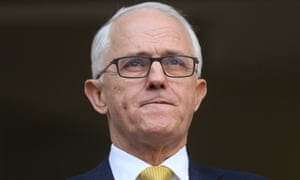Exclusive: Former PM tells Guardian Australia the party he once led
has been hurt by climate denialism becoming an issue of ‘identity’
Malcolm Turnbull
says Australia will struggle to meet its Paris emissions target without
rapid decarbonisation of the energy sector, and he says the Liberal
party’s continuing failure to develop a coherent climate and energy
policy is costing the country much-needed new investment in power
generation.
In a wide-ranging interview with Guardian Australia’s politics live podcast ahead of the publication of his memoir next year, the former prime minister said the Liberal party had struggled with climate change denialism since 2007 because climate change had morphed into an issue of “identity” rather than fact.
Other highlights of the interview included:
“I think in the absence of a rapid decarbonisation of the energy
sector, we will struggle to get to the 26-to-28%, that’s why the
national energy guarantee was very important,” he said.In a wide-ranging interview with Guardian Australia’s politics live podcast ahead of the publication of his memoir next year, the former prime minister said the Liberal party had struggled with climate change denialism since 2007 because climate change had morphed into an issue of “identity” rather than fact.
Other highlights of the interview included:
- Turnbull predicting Scott Morrison would have great difficulty curbing climate activism by adjusting the existing secondary boycott regime, saying: “I think it’s very likely not in line with the constitution.” He also argued the proposal floated by Morrison was fundamentally inconsistent with the principle of free expression.
- Turnbull saying the Murdoch media – “the dominant, the leading media group in Australia” – was a long-time promoter of climate denialism, making it harder to land a sensible policy. He laughed off this week’s statement from Rupert Murdoch that there was no denialism at News Corporation, declaring the proprietor was “not reading his own papers or watching his own cable news channels”.
- A flat rejection of the idea ventilated widely during the bushfire crisis that Australia had no material impact on climate change because it makes up only 1.3% of global emissions. “The reality is Australia has to take action to reduce emissions,” Turnbull said. “We have a commitment under the Paris agreement to do so. People also look to Australia as a developed country, a wealthy country, to take the lead, to take a leading role.” He said Australia’s current failure to act seriously to reduce pollution hampered its ability to persuade other countries to do their part.
- A declaration that it would be a major mistake if the Morrison government ended up subsidising coal, because “subsidising coal is about as crazy as it gets. The bottom line is renewables have won, that’s why no one in the energy sector is building new coal.”
- A swipe at the National party, noting some politicians claiming to represent farmers and people in the bush “were not speaking for farmers”, because farmers were battling on the frontline of a climate crisis. “The reality is people on the land are dealing with the consequences of a hotter and drier climate.”
Turnbull said Australia might be able to land the 2030 target with help from Kyoto era carryover credits, but their use was controversial. He said it would be better for Australia to use carryover credits to meet the 2030 target as an insurance principle, invoking that accounting to get there if necessary, rather than have the Kyoto credits carry half the abatement task, which is Morrison’s current policy.
He said the credits should not be a substitute for practical emissions reduction, because that only created problems down the track, as the 2030 target was just the first of a series of actions leading ultimately to net zero emissions by 2050.
Turnbull said he’d met recently one of the largest renewable energy investors in the world, who told him companies were avoiding Australia because of the lack of policy and because of political risk.
The former prime minister declared the energy sector was now “crying out” for settled policy, because the policy he attempted to implement, the national energy guarantee (Neg), had been blown up by “insurgents” and as a consequence of that “we have higher emissions and higher electricity prices”.
He said Morrison and the now treasurer Josh Frydenberg had been fully on board with the Neg. The Neg was “a joint project” with Morrison and Frydenberg, he said, and it had enjoyed consistent support in the cabinet.
But while Morrison and Frydenberg had been two of the government’s “keenest supporters” of the proposal, they would not bring it back because that would provoke the right wing of the Liberal party. Turnbull said they were aware there’s a group within the party “prepared to blow the show up if they persist with it”.
Turnbull said Peter Dutton, who led the coup against his leadership, “never criticised [the Neg] to my recollection”. He said Taylor, the current energy minister, was “an internal critic but it was never entirely clear why”. He said the rump of sceptics inside the Liberal and National parties remained a barrier to sensible climate action.
Turnbull said he continued to struggle to comprehend why climate change denialism persisted in the face of concrete evidence of warming.
“There are plenty of odd beliefs out there and conspiracy theories but what I have always struggled to understand is why climate denialism still has the currency that it has, particularly given the evidence of the impact of climate change is now so apparent, and it is particularly apparent to people living in regional and rural Australia.
“Precisely what has been forecast is happening.”

No comments:
Post a Comment